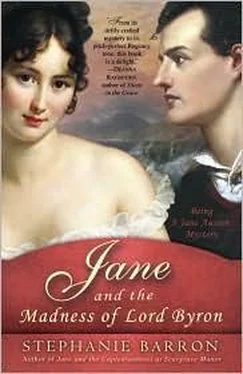There it was again: General Twining must be mercenary. That Louisa Silchester saw nothing to object to in this was hardly to be remarked upon; her understanding did not appear to be powerful.
“Lord Byron returned to Brighton, I collect?”
“And to his pursuit of Catherine,” the lady said ominously. “A direct approach having failed, he began to haunt Church Street — he has acquaintance in the vicinity — and barely a day went by that we were not forced to meet with his pleas. Entire cantos of poetry were left with Lord Byron’s card, which verses the General immediately confiscated and threw on the fire; a sad waste of talent, I daresay. It was as tho’ Lord Byron was mad with love , and I might have pitied him — but for the turn his passion took. You know too well the episode at Cuckfield; that he returned to Brighton at all, in defiance of a parent’s natural indignation, is to be wondered at — and that he should prove so bold as to appear at the Assembly , as tho’ nothing untoward had happened — ”
Mrs. Silchester was correct: Such behaviour must provoke wonder. Either Lord Byron was too firmly in the grip of passion to retain his reason, despite the claims of propriety; or he cared nothing for propriety at all. Either attitude, for a gentleman of his consequence, argued a disregard for the bounds of society that bordered on the mad. But when one had already so far overstepped convention, it was not, I reflected, so very far a stretch to murder .
“Having been discovered in an attempted abduction, I had assumed that his lordship would never descend upon Brighton again,” Louisa Silchester muttered. “But I failed to consider that nobody but ourselves was aware of the event; it could not be generally published; the town remained in ignorance, and welcomed Lord Byron’s return; the General observed the strictest silence, for Catherine’s sake. He had lately formed the idea of uniting her in marriage to a respectable clergyman — Mr. Hendred Smalls — from a desire to preserve the child’s good name. Questionable young officers and poets proved too much for the General’s patience; he wished to see Catherine safely bestowed in matrimony before another month was out. No reproach could attach to the virtue of Mr. Smalls’s wife, the General believed; no blemish could darken the Twining name. The General is very jealous of his dignity,” she added, by way of explanation.
“So I have been made to understand.”
“Lord Byron saw his advantage in our silence. Not content with destroying the poor child’s peace, he pursued her the length and breadth of the Assembly last night, calling Catherine by a heathen name — Leila , some Attic language of which I know nothing — glowering at her through every dance; thrusting his way, on that hideous leg, into her slightest conversation, to demand a private word she could not grant — his face by turns burning with passion, and dead white with rage. I could have kissed the painted feet of that Caro Lamb, when she entered the ballroom and put flight to the Fiend — I was never so pleased to see anybody in my life!”
Startled, I asked, “You are acquainted with her ladyship?”
“I knew her mother, the Countess, a little in my salad days,” Mrs. Silchester said dismissively. “Her daughter I confess I know not at all — but only fancy! She sought an introduction to Catherine and me! And nothing would do but that she must carry Catherine away for a private tête-à-tête at the Pavilion — such an honour, I am sure — promising faithfully to see the child home in one of the Regent’s carriages, when at last they were done.”
I felt myself go swiftly cold. “Miss Twining left the Assembly in Lady Caroline’s company? And the General made no objection?” This was hardly being jealous of his dignity, or his daughter’s reputation; only the ignorant encouraged the attentions of the scandalous Caro Lamb.
“The General was no longer present; he could not be appealed to. I saw no harm in Lady Caroline’s condescension. Catherine wished to go.”
Catherine had wished to return to a place she despised upon first acquaintance — a place where no less a roué than George Hanger had forced his attentions upon her — and the woman entrusted with her safety had sent her off with a complete stranger. The whole narrative defied comprehension.
“You blame me,” Louisa Silchester said. “I am sure you blame me, Miss Austen. But after all, what was I to do? The Pavilion, you know! It was very nearly a Royal summons! I could not gainsay so obliging and august a personage. Indeed I could not. And so of course I granted my permission. But the General is so dreadfully angry! He would not admit me this afternoon, when I attempted to pay a call of condolence! If the General abandons me, Miss Austen, so shall all of Brighton — and then I do not know what I shall do!”
Chapter 14 A Call to Justice
TUESDAY, 11 MAY 1813
BRIGHTON, CONT.
“WHAT HAVE YOU BEEN SAYING TO POOR LOUISA SILCHESTER?” Lady Swithin demanded as she led me to the fire, where a pair of chairs were at liberty, owing to the general warmth of the night. “She looks as if she had received a sentence of death—tho’ I suppose that is very natural, given the loss of her protégée.”
“I did not rebuke her; tho’ I confess I was tempted. She is an excessively silly woman, my lady—and ought never to have been entrusted with Miss Twining. She tells me she allowed the child to go off to the Pavilion last night with Caro Lamb!”
“Did she?” Desdemona enquired, all interest. “I had not an idea of it. I stayed only to observe Byron’s outrage at Caro’s entrance—to judge the effect her costume made upon the room—and then Swithin pled boredom, and we made good our escape. What did Caro mean by carrying that child off to the Pavilion? They were not acquainted before last night, I am sure—and there must be more than a decade between them in age. It is a singular condescension.”
“I cannot say what her ladyship was about, but I must endeavour to learn,” I replied. “Lady Caroline should have been one of the last to see Catherine Twining alive. It may be in her power to disclose something vital of the child’s movements. At what hour did you quit the Assembly, my lady?”
Desdemona shrugged. “Far too early for Fashion. It was not above one o’clock, I am sure—Lady Caroline having put in her appearance just after midnight. But do sit down, Miss Austen”—the Countess was already arranging the folds of her silk gown—“so that we may be comfortable. No one shall teaze us; your blacks will keep them all at a distance, you know.”
I sat. My mind, I confess, was worrying at the problem of Lady Caroline—and my thoughts ranged so far abroad as to render me almost uncivil. I drew my attention back to my hostess; she had, after all, summoned me to her home that evening with the object of conversation.
“You must have formed your own opinion of Catherine Twining,” she began. “For my part, I knew her not at all. But any lady capable of engaging Byron’s entire interest, must have been a paragon. And when one considers her youth—it is in every way extraordinary. He has been in the habit of pursuing married ladies of a certain age—not virgins of fifteen.”
“Our acquaintance was so slight, and of such recent formation—we met in a stable yard in Cuckfield, on the journey south,” I said. I hesitated at disclosing the nature of our meeting—but the silence so fervently embraced by the General and Mrs. Silchester had already done damage enough; I could not regard myself as bound by it. “I rescued Miss Twining from Lord Byron’s clutches, in fact. He had formed the intention of abducting her—to what end, a Gretna marriage or a swift ruin, I know not. Certainly he had bound her wrists and gagged her; she made her presence known by beating on the side panels of Lady Oxford’s chaise, which his lordship had borrowed for the purpose.”
Читать дальше












